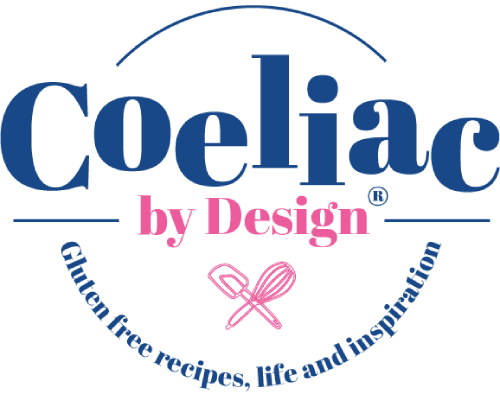Will your recipes just be gluten free?
Yes. However, most of them will be adaptable and may easily fit into other dietary categories too. Please just give me a shout should you want any help with adjustment to any recipes.
Why is it so important to get a medical diagnosis?
If you have coeliac disease you need to follow strict gluten free diet for life. This will safeguard you against other more serious health complications. Once diagnosed you should be referred to a dietician and receive yearly health checks. Ideally, they would be carried out at a coeliac clinic, but sometimes this will be done via your GP. If you don’t automatically get called for an annual check, you must ask for one. From my annual check this year, it was picked up my vitamin D was low, and I have been popped on vitamin D tablets. You should also be referred for a bone density scan when you are first diagnosed. https://www.coeliac.org.uk/coeliac-disease/getting-diagnosed/importance-of-medical-diagnosis/
Can coeliac disease run in the family?
Yes, like many other medical conditions, coeliac disease can be hereditary and very often more than one family member will have the condition. Therefore, upon diagnosis it’s really important that the rest of the family are also tested. Currently Coeliac UK advise that parents, brothers and sisters (adult and child) of a diagnosed coeliac are tested. This test should be repeated over time too, as coeliac disease can develop at any point. In addition to this, I have also spoken to lots of grandparents, aunties, uncles, cousins, nieces and nephews within the same family that also have the condition and personally feel (in an ideal world) screening for coeliac disease would be carried out on both immediate and extended family as well.
https://www.coeliac.org.uk/coeliac-disease/getting-diagnosed/screening-for-coeliac-disease/
In Australia there is a printable letter available on the Australian coeliac society website that your relatives can take to their GP explaining the situation, and requesting they are also tested. I think this is a brilliant idea and have mentioned it to Coeliac UK to see if it’s something we could do here in the UK.
I’ve been told I have IBS and to follow a gluten free diet. Should I be tested for coeliac disease before removing gluten from my diet?
Yes, most definitely, coeliac disease and any other bowel related conditions MUST be ruled out before a diagnosis for IBS is confirmed, as currently there is no specific test for IBS and therefore it can only be concluded after all other related medical conditions have been been eliminated. Unfortunately, people with suspected IBS can sometimes (wrongly) be advised, to remove or reduce gluten before they have been tested for coeliac disease, just to see if it will help with their symptoms. Whilst people may not feel any harm is being done by doing this, without a medical diagnosis for the condition you may not be as diet compliant, resulting in other mores serious health complications at a later date (also it can be a real struggle to reintroduce gluten to be tested at a later date). In addition, you will not receive the medical monitoring a coeliac patient requires, such as bone density scans, annual blood checks, vaccines. The reason you have to remain on a normal diet whilst being tested for CD is that currently an accurate test can only be concluded whilst gluten is present within your diet 6 weeks prior to testing. This information applies before following a FOD map diet too, as this also restricts gluten in your diet and could result in a false/negative test result for coeliac disease. If you are experiencing symptoms or you feel gluten is causing you a problem speak to your GP and request to be tested.
https://www.coeliac.org.uk/healthcare-professionals/diagnosis/why-testing-ibs-patients-for-coeliac-disease-is-important/
Why is it so important not to remove gluten until all my tests have been completed?
As the only treatment for coeliac disease is a life-long gluten free diet, removing gluten before you have had all your tests done could start the healing process. And therefore, your test results could come back inconclusive. The last thing you want is a negative test result when in fact you have coeliac disease. Check out the link below from Coeliac UK – I feel this is one of the most important things they address on their website.
https://www.coeliac.org.uk/coeliac-disease/getting-diagnosed/
Once diagnosed with coeliac disease or dermatitis herpetiformis is it OK to occasionally eat gluten?
No. I have spoken to so many people diagnosed with coeliac disease who believe that as they have felt no ill effect when they had eaten gluten containing food, thought it would be OK to continue doing so. I promise you, it is NOT!! If you think, prior to being diagnosed you may not have suffered any symptoms, but your endoscopy/biopsy would have confirmed damage to your villi within your small intestine and unfortunately, if you are then not diet compliant, your villi will not heal and your body will not absorb the nutrients it needs. Consider this, a piece of bread the size of a marble is enough to cause damage to your villi if you have coeliac disease. So, whether you are symptomatic or not, if you have coeliac disease you must skip the gluten….end of story!
For further FAQ regarding coeliac disease please have a look at this page on Coeliac UK website…its really helpful.
https://www.coeliac.org.uk/coeliac-disease/coeliac-disease-faqs/
It’s important that you chat to your GP/Specialist about any health concerns you may have and never be afraid to ask for a second (or however many times it may take) opinion if you feel something isn’t quite right. You matter.
As you know, I’m not medically trained, but have gained much knowledge over the years through living with coeliac disease, following a gluten free diet and proudly working for Juvela gluten free foods for many years.
Liz x

